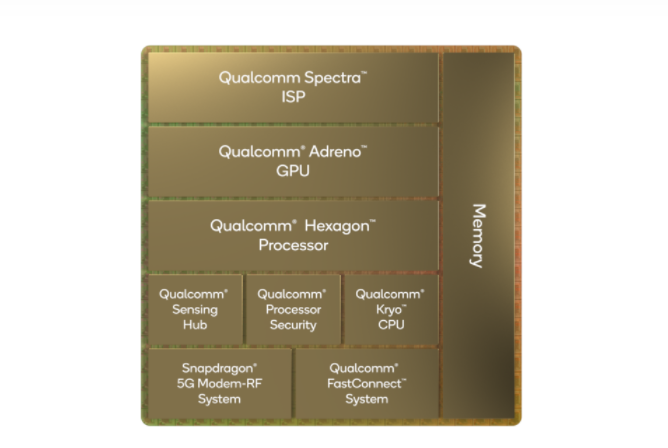Apple has always been in its own alliance in developing mobile phone processors and embedding its own artificial intelligence experience. But this year, Google launched its local Tensor chip, providing Pixel 6 with a platform to showcase the company's vision for smartphones. Technology giants are aggressively entering the chip industry, which means Qualcomm, once a leader in the smartphone industry, will face unprecedented competition. Therefore, this year, this chip manufacturer heavily relies on artificial intelligence to give its new processor Snapdragon 8 Gen 1 more personality. The company is launching the 7th generation Qualcomm AI computing engine, which is four times faster than its predecessor. Google Tensor Chip, a chip manufacturer, claims that the new unit is more powerful because it has twice the shared memory and twice the tensor accelerator for AI related operations. In addition, the battery efficiency is 2.8 times higher than this year's flagship Snapdragon 888 processor. In addition, there is a new third-generation sensing unit that can achieve ultra-low power speech and connectivity experiences. Now that we have understood the AI specifications of the new chip, let's take a look at what it means for phone manufacturers, developers, and consumers.
What can the new AI unit do?
Vinesh Sukumar, head of AI/ML product management at Qualcomm, stated that the new AI department can easily handle more workloads. The company and video imaging company Arcsoft have developed a demonstration where a prototype phone based on Snapdragon 8 Gen 1 can perform facial detection and apply facial shot effects simultaneously.
Sukumar stated that this new technology allows software to detect more than 20 points on the face, so even in situations of poor angle or small field of view, application manufacturers can apply the effect.
The new sensing center enables the chip to provide a consistently online camera experience for facial and object detection at low power consumption.
There is also a new 'always secure' module within the sensing center, allowing applications to conduct financial transactions in a more secure manner.
Why does Qualcomm collaborate with the company to achieve a different experience? So far, Qualcomm chips typically provide mobile phone manufacturers with canvases to draw their own paintings. Although the situation may still be the same, this year, the company is collaborating with many companies to provide more styles for different artificial intelligence experiences.

Qualcomm Snapdragon 8 Gen 1 High Level Architecture
Firstly, in order to enhance the camera experience, including captivating black and white photos and shot effects, Qualcomm is collaborating with German imaging company Leica. Previously, it had collaborated with manufacturers such as Huawei and Xiaomi. But this is a rare situation where chip manufacturers collaborate specifically with camera manufacturers. Sukumar stated that camera manufacturer Leica is a key partner in developing artificial intelligence to capture high-quality and dense images with rich spatial details. He said that this technology will enhance the dynamic range and clarity of images. Qualcomm also collaborated with the health organization Sonde to showcase an application that can record your voice for 30 seconds and detect your stress level, asthma condition, and even COVID-19. This is not entirely new: Israeli startup Vocalis has already achieved similar feats through applications, but in Qualcomm's case, all processing is done locally to maintain the integrity of user privacy. One of the most important partners is Hugging Face, an open source startup dedicated to language based machine learning models. Qualcomm has demonstrated an intelligent assistant that uses sentiment analysis to categorize the most important notifications for you. In addition, you can view the notification summary based on the priority of the notification. The assistant can also answer questions such as' Where will my dinner be? '. And 'When will I leave?' all of this reminds me of Google Assistant. But Jeff Gehlhaar, vice president and head of AI software at Qualcomm, told me that this partnership will lead to a wider range of use case combinations. I really want to see an assistant with better functionality than Google Assistant, so I brought it to Qualcomm.
What are the benefits for developers?
Qualcomm announced this year that it has introduced support for mixed precision instructions in its SDK, allowing developers to make their AI models run faster with less memory usage. However, the biggest change is the introduction of Neural Architecture Search (NAS) for Qualcomm chips. NAS enables data scientists to optimize models for specific hardware without the need for manual training. They can also limit the size or other parameters of the model based on use cases. This chip manufacturer is collaborating with Google Cloud to provide the backbone for this NAS product. Qualcomm will use Google Vertex AI solution for managed machine learning, so developers can easily train models for their chips. This partnership will allow developers to not only adjust their models for mobile devices, but also for Qualcomm's XR, IoT, and automotive solutions.
Competing against Apple, Samsung, and Google
Apple has been using its own chips on its iPhone, while Samsung is mixing its local Exynos processor with Qualcomm's Snapdragon processor on its devices. This year, Google gave up Qualcomm for the first time, and the competition in the chip market is undoubtedly intensifying. This US based chip giant will need to prove that its processors are as powerful or even better than those of Apple, Samsung, or Google. For this reason, it places the responsibility on artificial intelligence. It would be surprising to see companies like OnePlus, Samsung, or Xiaomi using Qualcomm's new devices to bring AI experiences we have never seen on iPhones or Pixels. Game begins!